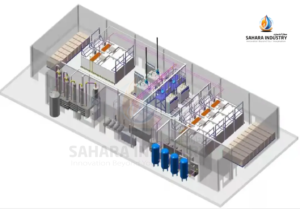 Sahara Industry has emerged as a significant player in the field of environmental engineering by providing sustainable wastewater management solutions. Their work in Sewage Treatment Plants (STPs) is a key part of their mission to create a better future, focusing on water conservation, environmental sustainability, and community health. With a deep commitment to innovative solutions, Sahara Industry is addressing some of the most pressing water and sanitation challenges faced by urban and industrial areas.
Sahara Industry has emerged as a significant player in the field of environmental engineering by providing sustainable wastewater management solutions. Their work in Sewage Treatment Plants (STPs) is a key part of their mission to create a better future, focusing on water conservation, environmental sustainability, and community health. With a deep commitment to innovative solutions, Sahara Industry is addressing some of the most pressing water and sanitation challenges faced by urban and industrial areas.
The Importance of STPs in a Water-Stressed World
Water scarcity is becoming an increasingly severe global issue. According to the World Resources Institute, nearly one-third of the world’s population lives in water-stressed regions, and this figure is expected to grow. Wastewater management is a critical part of solving this crisis. Sewage treatment plants (STPs) play a vital role in ensuring that the wastewater generated in residential, commercial, and industrial settings is treated and reused instead of being released untreated into the environment.
STPs are designed to remove harmful contaminants from sewage water, ensuring that the treated water can either be safely released into the environment or reused for non-potable applications such as agriculture, landscaping, and industrial cooling. By investing in STP technology, Sahara Industry is helping to conserve water and protect ecosystems.
Sahara Industry’s Role in Advancing STP Technology
Sahara Industry has made notable advancements in STP technology, which are crucial in making wastewater treatment more efficient, cost-effective, and environmentally friendly. They offer state-of-the-art solutions tailored to the needs of various sectors, including residential complexes, industrial plants, and municipalities. Some key features of their STP solutions include:
1. Modular Design : Their modular STPs are designed to be scalable, allowing them to cater to both small and large-scale needs. This flexibility makes it easier for communities and industries to implement sewage treatment systems that can expand with demand.
2. Energy Efficiency : One of the major innovations Sahara Industry has focused on is reducing the energy consumption of STP plants. By incorporating energy-efficient processes such as biological treatment, anaerobic digestion, and solar-powered components, Sahara Industry ensures that their STPs have a low carbon footprint while maintaining high efficiency.
3. Advanced Filtration and Disinfection : Their STPs utilize advanced filtration and disinfection technologies, including membrane bioreactors (MBR), ultra-filtration (UF), and UV disinfection. These technologies ensure that the treated water is of high quality, safe for reuse, and free from harmful pathogens and pollutants.
4. Automation and Smart Monitoring: Sahara Industry has incorporated smart technologies into their STP plants, making it easier to monitor water quality, plant performance, and operational efficiency. Automation and real-time monitoring reduce human intervention, ensuring consistent performance and immediate detection of any issues, which leads to fewer breakdowns and operational disruptions.
Contributions to Environmental Sustainability
Sahara Industry’s STP plants contribute significantly to reducing environmental pollution. Untreated sewage is a major source of water pollution, contaminating rivers, lakes, and groundwater, which in turn affects aquatic ecosystems and human health. By treating sewage effectively, Sahara Industry is not only ensuring that water sources remain clean but also supporting efforts to conserve natural ecosystems.
Additionally, the treated water from STPs can be used for irrigation, reducing the demand for freshwater in agriculture and landscaping. In industrial settings, treated water can be reused for cooling, cleaning, and other processes, which further reduces the strain on freshwater resources.
Addressing Urban Wastewater Challenges
Urbanization is leading to increased pressure on water and sanitation systems. Cities are producing more wastewater than ever before, and traditional infrastructure often struggles to keep up. Sahara Industry’s solutions are specifically designed to meet the growing demand for efficient wastewater treatment in urban areas. Their decentralized STP plants can be installed in residential complexes, commercial spaces, and municipal areas, providing local wastewater treatment solutions that reduce the load on centralized systems.
A Commitment to Social Responsibility
Sahara Industry is not only focused on technology but also on social impact. By providing affordable and efficient wastewater treatment solutions, they are helping communities, particularly in developing areas, address sanitation challenges. Access to clean water and proper sanitation are critical for public health, and Sahara Industry’s work ensures that even underserved populations can benefit from improved water quality.
Their initiatives in creating awareness about the importance of water conservation, promoting the reuse of treated wastewater, and engaging with local communities demonstrate their commitment to building a sustainable future.
Conclusion: A Vision for a Sustainable Future
Sahara Industry’s work with STP plants is a testament to their vision of a future where water resources are conserved, pollution is minimized, and communities have access to clean water. Their innovative approach to wastewater treatment and dedication to environmental sustainability are creating a positive impact not only for today but for generations to come. As they continue to expand their reach and refine their technologies, Sahara Industry is truly shaping a better future through responsible wastewater management.
By addressing water scarcity and contributing to environmental protection, Sahara Industry is proving that the path to a sustainable future lies in innovation, responsibility, and collaboration.

